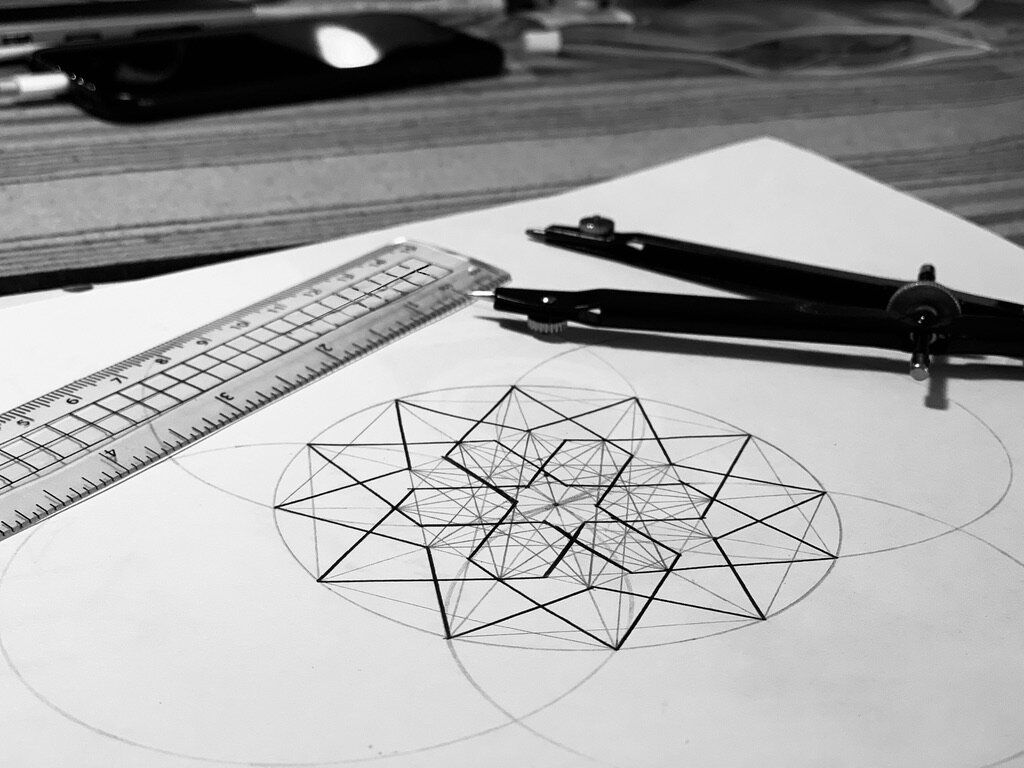Overall Course Structure.
The courses fall into an overarching structure based on the idea of an inherent methodology. The greatest thinkers of the past discerned an intrinsic unfolding within the process of thought and its subject matter; we follow them in conceiving a logic, which in addition manifests as nature and mind. Each of these has a threefold structure as presented below.
1. Finite Logic.
Philosophy of becoming; Philosophy of quantity (arithmetical and geometrical); philosophy of infinity (analysis); philosophy of measure.
2. Reflective Logic.
Philosophy of external reflection; philosophy of ground; philosophy of existence as appearance; philosophy of modality.
3. Speculative Logic.
Philosophy of conception (judgement and inference); philosophy of the object, teleology, and life; philosophy of cognition; methodology.
A1. Mechanics of Nature.
Philosophy of space and time; philosophy of matter (inertia) and motion; philosophy of free motion (gravitation).
A2. Physics of Nature.
Philosophy of light and sound; philosophy of electromagnetism; philosophy of temperature; elemental and chemical philosophy.
A3. Organics of Nature.
Philosophy of finite life (vegetative); philosophy of animal life; philosophy of the genus, species, and sexual relation.
B1. Finite Mind.
Philosophy of the soul (anthropology); phenomenology of mind (epistemology); psychology of mind.
B2. Appearing Mind.
Philosophy of law (natural right and morality); philosophical ethics (virtue and trust); philosophy of history (inc. hermeneutics).
B3. Mind as Absolute.
Philosophy of art; philosophy of religion; philosophy of interpretation; philosophy of science in its definitive form.
Each of the above divisions addresses a specific set of questions. The broadest of questions encompass several of the divisions. Hence a question like ‘what is life?’ belongs to certain parts of Speculative Logic as well as the Organics of Nature. Other questions, such as ‘what is law?,’ can largely be confined to one of the divisions. In this way the concerns of a given course gain a clear orientation with respect to the general structure, and tailored courses can easily be created in order to meet specific interests.

Course Subjects.
Philosophy as conventionally taught proceeds without an inherent methodology. For this reason we have constructed an extensive series of courses that correspond to the conventional division of philosophical subjects, following as far as possible the guiding order set out above. This is for the benefit of students and for those unfamiliar with the agenda of the school. (It will be noticed that nature is, unfortunately, almost entirely absent from this scheme.)
Logic.
A course on logic, from its origins in Aristotle, to Boole, down to the present time.
Metaphysics.
A course looking at metaphysics, from Plato, down to the rationalists, and the idealists after Kant’s first Critique.
Epistemology.
A course dealing with certainty, scepticism, and truth, from Plato and Descartes down to the present.
Philosophy of Mind.
A course on philosophical psychology, drawing on ancient thought about the soul, down to modern figures like Ryle.
Law and Politics.
A course on the philosophy of law and politics concerned with the question of Justice, the State, and natural right.
Ethics.
A course addressing the fundamental ethical questions, from Aristotle down to contemporary debates.
Aesthetics.
A course centred on the philosophy of art, addressing questions of beauty and autonomy, from Plato to Adorno.
Philosophy of Religion.
A course focused on the question of religious belief and the concept of God as conceived throughout history.
Chronology of material.
We also offer courses that follow a chronological order. Here the key question in each case is that of the differing conceptions of reality that existed at differing times. Our grasp on things, our weltanschauung (‘world-view’), largely determines our mode of living and thinking, but need not for that reason coincided with knowledge. Genuine insight is caught in the very process out of which it emerges, making it very hard to identify the truth in what is generally known. The differing conceptions of reality that we find in our history bear witness to the differing states of knowledge that have come to pass. To know these attempts is to know the course of our collective development, and it is only by means of this vantage that we are genuinely able to judge the present insights of our sciences. In this sense, to know history is to know the meaning of the scientific endeavour.
Classical and Early Eastern Era (630 - 320 BC) .
This series of courses covers that extraordinary era that has been dubbed the ‘Axial Age’ [‘Achsenzeit’] due to the fact that it marks one of the most significant turning points in human knowledge. We work through the Pre-Socratics and the major figures of Chinese thought, then the Greek tragedians, followed by the most significant of Plato’s dialogues, and most of Aristotle’s remarkable oeuvre. The course comes to an end around the time of Alexander’s deaths.
Hellenistic Era (310 BC - 20 AD).
The Hellenistic Era, which spanned the three-hundred years following Alexander’s death, was characterised principally by the pervasive influence of Greek culture upon the Mediterranean world. The philosophical schools associated with this time were Epicureanism, Stoicism, and Scepticism. These form the principle focus of the courses. Mathematics also flourished during this period and so warrants considerable attention. The courses conclude with an excursus into the Early Buddhist and Hindu thought that was contemporary with Hellenistic culture.
Roman Era (30 BC - 500 AD) .
These courses focus on the achievements of Roman thought and the various schools of thought associated with that same Era. The courses open with a study of the Roman historians before moving onto the Latin ‘Golden Age.’ From here we pass to a study of the Roman Jurists and late Stoic thought. An analysis of the New Testament Gospels follows this, then an in-depth look at Neoplatonic thought and late Hellenistic mathematics. The courses conclude with a study of the Church Fathers, most significantly St Augustine.